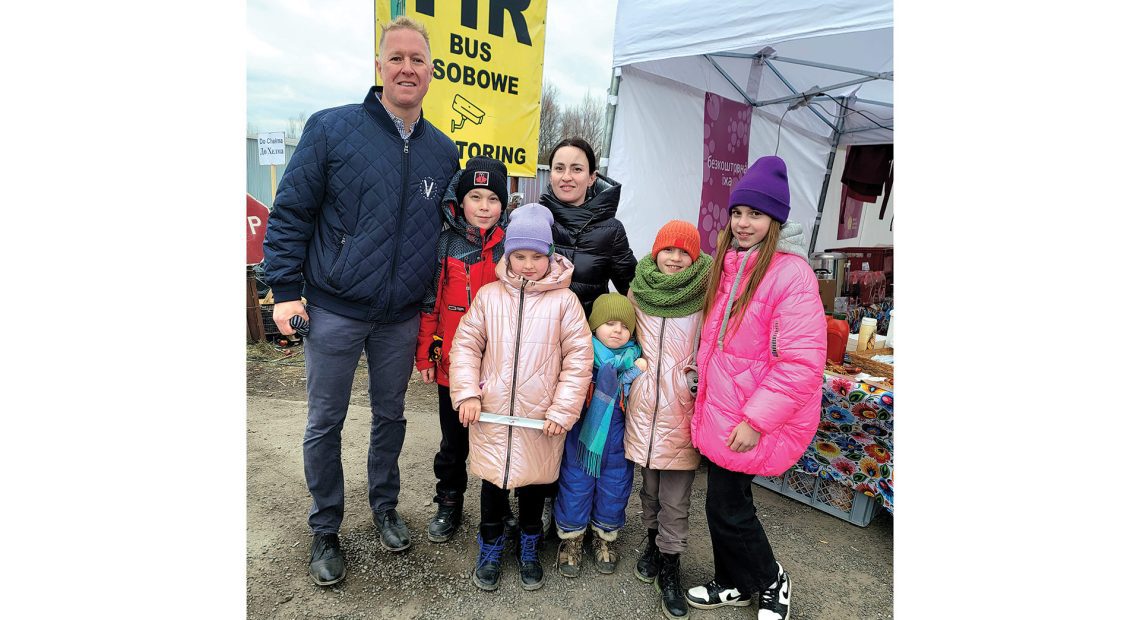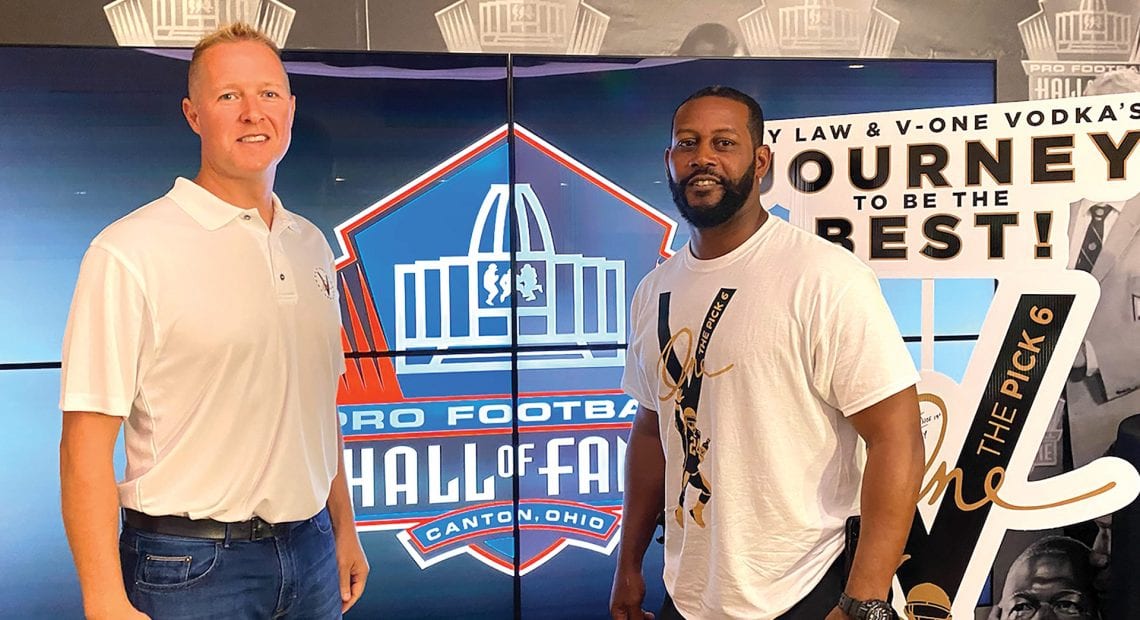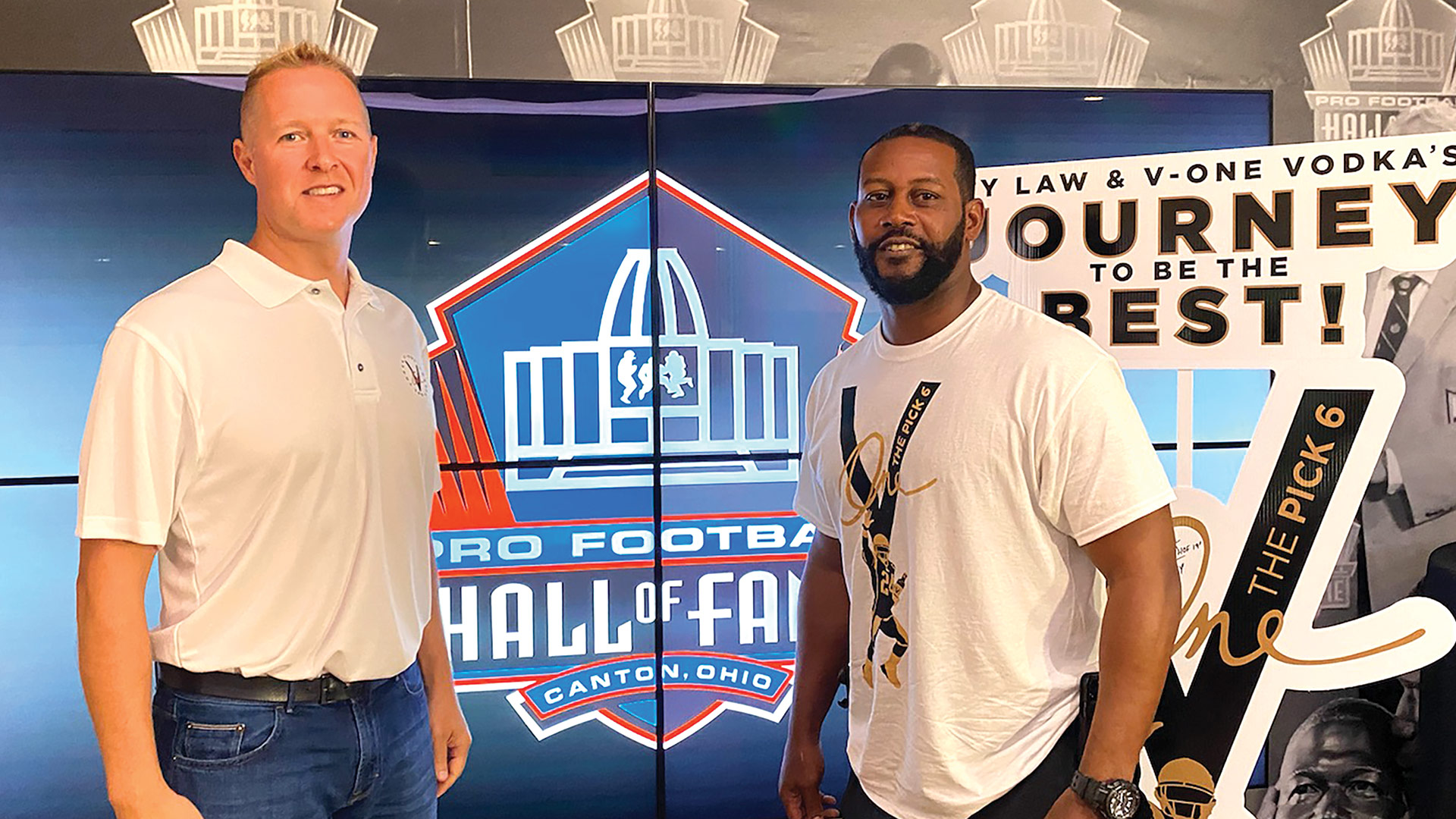Uplifting Spirits
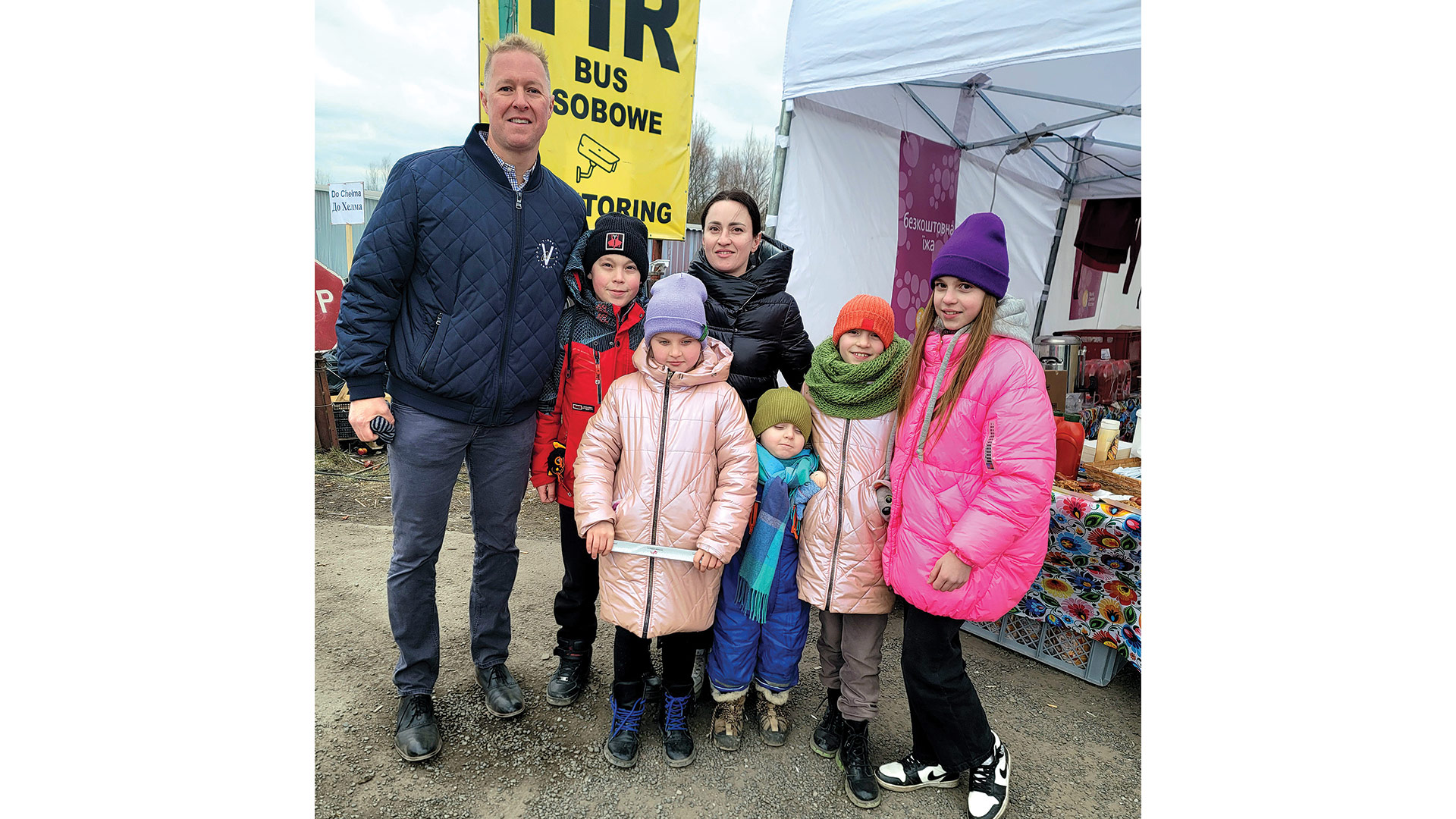
For most in this region, the war in Ukraine is something to read about or see on the nightly news. For Paul Kozub, founder and president of V-One Vodka, who operates a distillery in Poland just a few hours from the border with Ukraine, the war hits much closer to home — figuratively, if not literally. He made a trip to Poland and then the border in March, and he’ll be going back in July, bringing cash for refugees and other types of support.
Paul Kozub says he’d like to forget some of the things he saw and heard while on his trip to Poland and its border with Ukraine in March, just days after the fighting began there. After all, he was seeing people in extreme distress — women and children, mostly, who were leaving their home country, sometimes with just on their clothes on their back, not knowing if they would ever be returning.
But these words and images, and there are many of them, are burned into his memory, he said, and they make him even more committed to doing what he can to help refugees who have made their way to Poland, where Kozub, founder and owner of V-One Vodka, owns a distillery.
“What I saw and what I experienced was mind-blowing, especially in 2022,” he recalled, adding that he wound up making three trips to the border in March, with each visit lasting seven or eight hours. “We saw the buses on the highway filled with women and children — martial law was declared in Ukraine, so no men under the age of 60 were allowed to leave the country. So you just saw women and children leaving, fleeing in buses on the highway — bus after bus after bus full of people.
“On the border, there were tents set up for food and a kind of transition spot,” he went on. “But you’d see women 70-or 80-years-old crossing with bags, and young women with strollers and children just walking over the border.”
Kozub told BusinessWest that he felt compelled to travel to Poland in March. He wanted to visit the distillery, located in the town of Lublin, something he’s done every few months over the past several years, although far less frequently since 2020 due to COVID, but also to support refugees if he could.
He left with several thousand dollars in cash, most of it in $100 bills, that he distributed to several different individuals and families knowing that the way exchange rates were moving, U.S. currency would buy much more than the Polish dollar. He made a few trips to the border, which is about a 90-minute drive from the distillery, and in doing helped bring the war to this country through a few interviews with a Boston television station that picked up his story and talked with him from his hotel room and at the border.
“I never thought I’d be a war correspondent, but there I was talking about what I saw and what I experienced,” he said. “To me there’s no more clear example of good versus evil, a country that’s invaded for no clear reason.”
Today, Kozub is planning a return visit to Poland and his distillery with his family — his wife and four children. He’s not sure if he will make it to the border, but does plan to visit some refugee centers and try to reconnect with several of the people he met three months ago.
He plans to visit the Help the Ukranian Children Foundation in Zyrzyn, Poland, which he is supporting through a special label for his vodka, one with the blue and yellow of the Ukranian flag; $2 from the sale of each bottle going to support refugees.
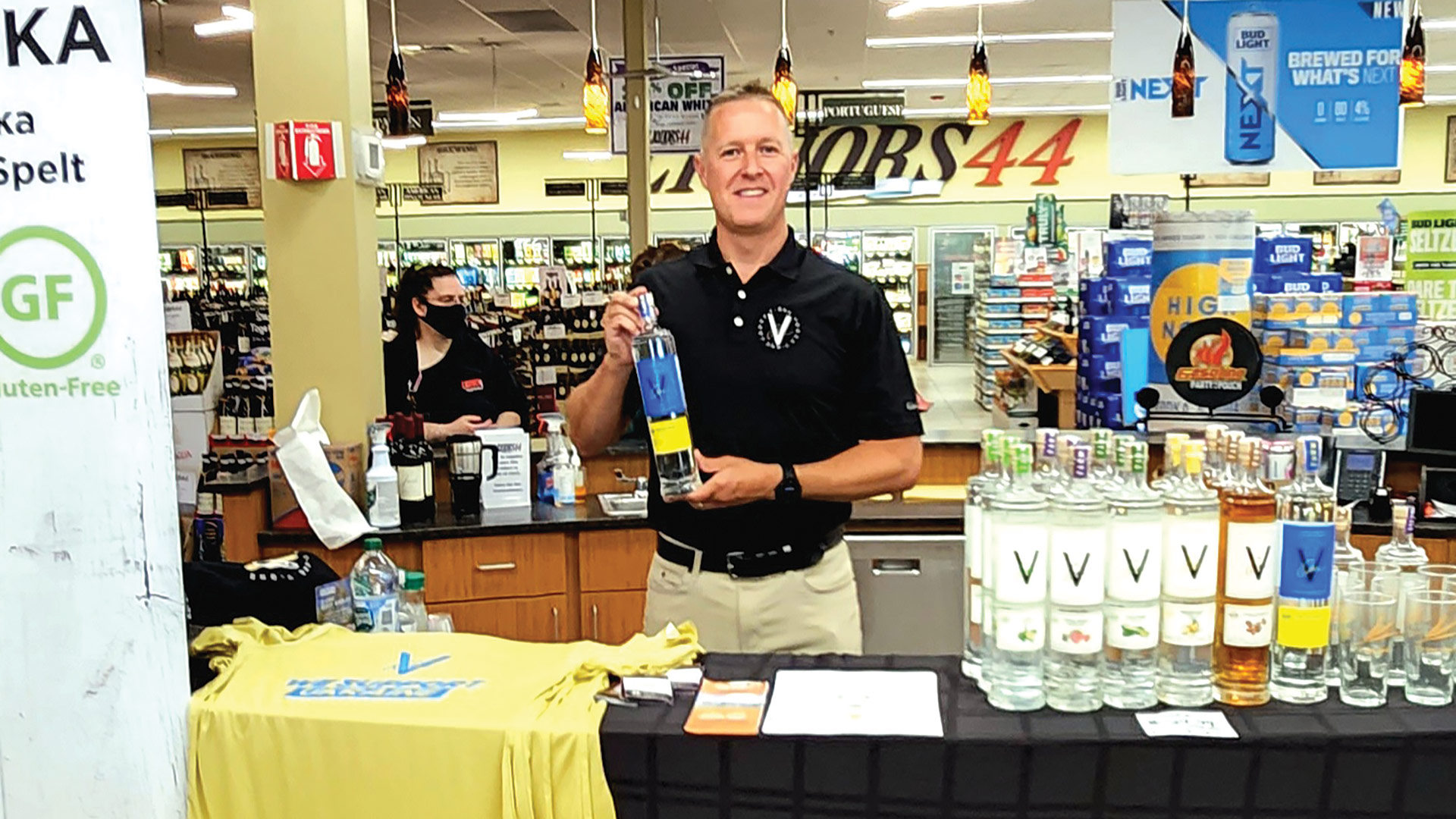
Paul Kozub displays one of the new-edition bottles bearing the color of the Ukranian flag. He is donating $2 from each bottle to help refugees.
For this issue, BusinessWest talked with Kozub about how the war in Ukraine — and the plight of those who have fled that country for Poland — have become personal for him, and how he continues to find ways to not only support those individuals and families, but also shed needed light on their situation.
Proof Positive
As noted earlier, Kozub has many indelible memories from his March visit, one that brought the war in Ukraine and its profound impact on its people, home in ways that can’t be appreciated by simply tuning into CNN.
He used the word ‘surreal’ more than a few times to describe what he saw, especially during those visits to the border.
“Poland was normal for the most part — there were a lot of Ukrainain flags,” he recalled, “But as we were driving toward the border, and as we got to within 10 miles of the border, there was nobody … no cars going in our direction; instead, we saw all the buses going in the other direction.
“What I saw and what I experienced was mind-blowing, especially in 2022.”
“That was the first time we got a little anxious,” he went on. “Once we got to the border, we befriended a few Polish police men and women who started telling us the stories they were hearing.”
One memory stands out for him. It involves giving a ride to a young girl and her parents to the city in Poland where he was staying.
“We didn’t notice until they got out that they had nothing,” he recalled. “No bags, no nothing, just the clothes on their backs. The way the man was dressed — he had a nice watch, nice clothes on, nice shoes — you could see that they just left so quickly they didn’t have time to pack a bag. Seeing stuff that like really hit home.
Kozub said he left for Poland with the expectation that he would bring a few thousand dollars to the border, maybe visit once and try to help people as they were coming into Poland during the first days of the war. But those expectations were altered by what he encountered, and also by contributions sent to him in advance of his trip, including $4,000 from his commercial lender, PeoplesBank — the most that can be sent via VENMO.
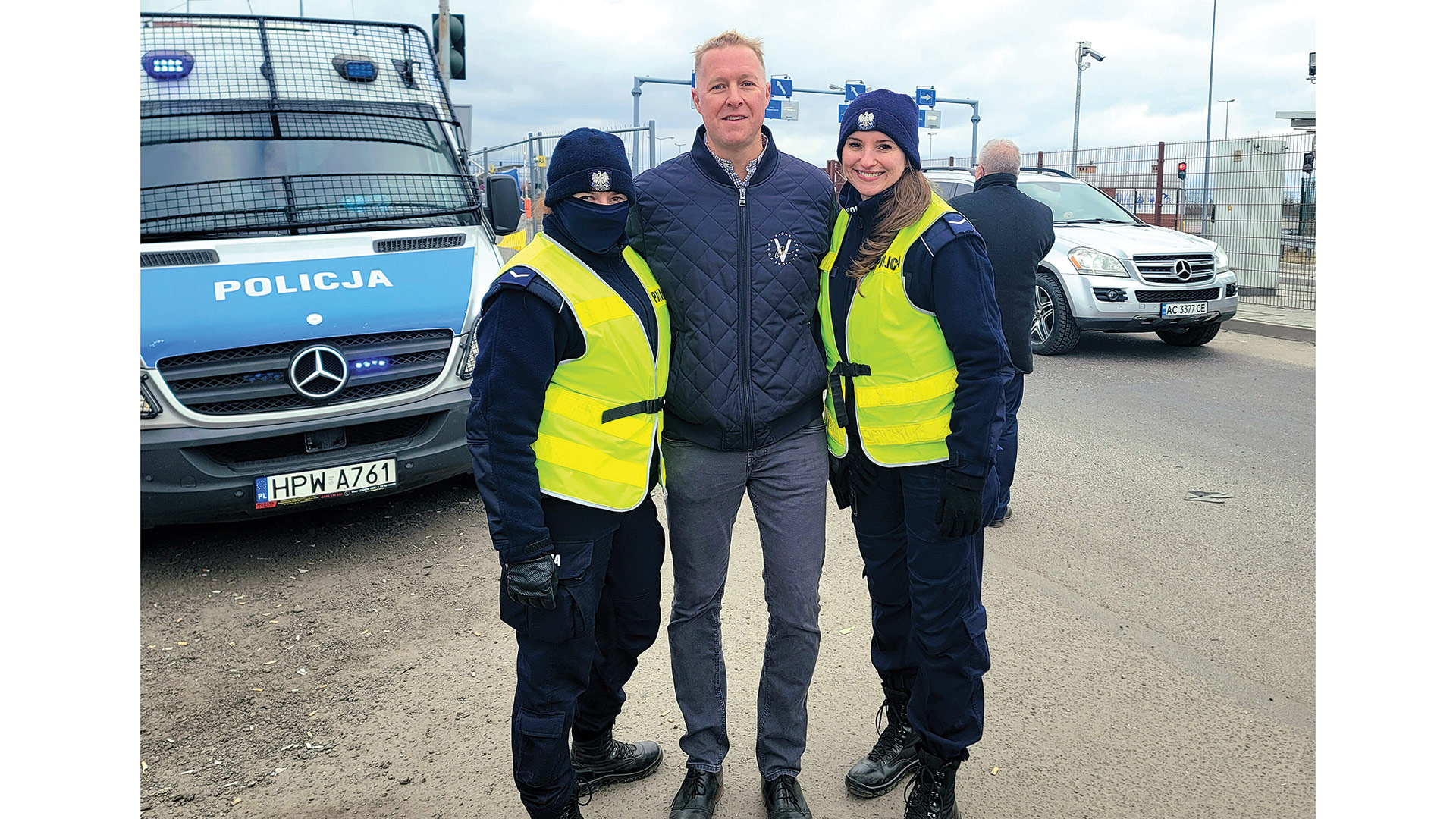
Paul Kozub, seen here with police officers at the border, will be returning to Poland next month.
“That contribution really helped — while I was there, I was able to buy so much more,” he recalled, noting that he was able to buy a washer and dryer for an apartment building now housing 80 women and children, and also bring more needed food and water to the border.
He recalled one instance where he tried to help a woman with four young children.
“All these people didn’t want to accept money from me at first,” he recalled. “But I said ‘you have to — that’s why I traveled all this way.’
“That was back when there were tens of thousands of people coming over every day — that’s when most of the need was going on,” he recalled, adding that the sights from those days remain with him even though the scene has changed, as have the needs of the refugees that have made their way to Poland.
While what he saw was disturbing on many levels, so too was what he heard from some of those he encountered, he said, noting that he has come to understand the Polish language, which is very similar to what is spoken in Ukraine.
“As we were driving toward the border, and as we got to within 10 miles of the border, there was nobody … no cars going in our direction; instead, we saw all the buses going in the other direction.”
“We could understand most of what they were saying,” he noted. “We would see the cars of people driving into Poland, and they would have pieces of paper in the window with ‘ditya,’ which is ‘child’ in Russian written on them. We were hearing stories that the Russians were shooting at them; they were bombing these lines of cars as they were leaving.
“The stories of atrocities that we’re now hearing every day … I was hearing them in the beginning,” he went on. “It is so unbelievable that this is going on today; it’s very heartbreaking, and you just don’t want to believe that it’s true.”
While there are still some people leaving Ukraine for Poland, much of the activity is now moving in the other direction, with many returning to the country they fled. Still there are millions still in Poland forging a new life for themselves there, a challenge made simpler by the Polish government’s decision to change its law and allow people from the Ukraine (which is not part of the European Union) to come into that country and work and start businesses.
“In some of the major cities, like Warsaw and Krakow, they’ve seen a 30% to 40% increase in population,” said Kozub, adding that refugees are finding housing in the homes of Polish residents, in churches, camps, and other sites.
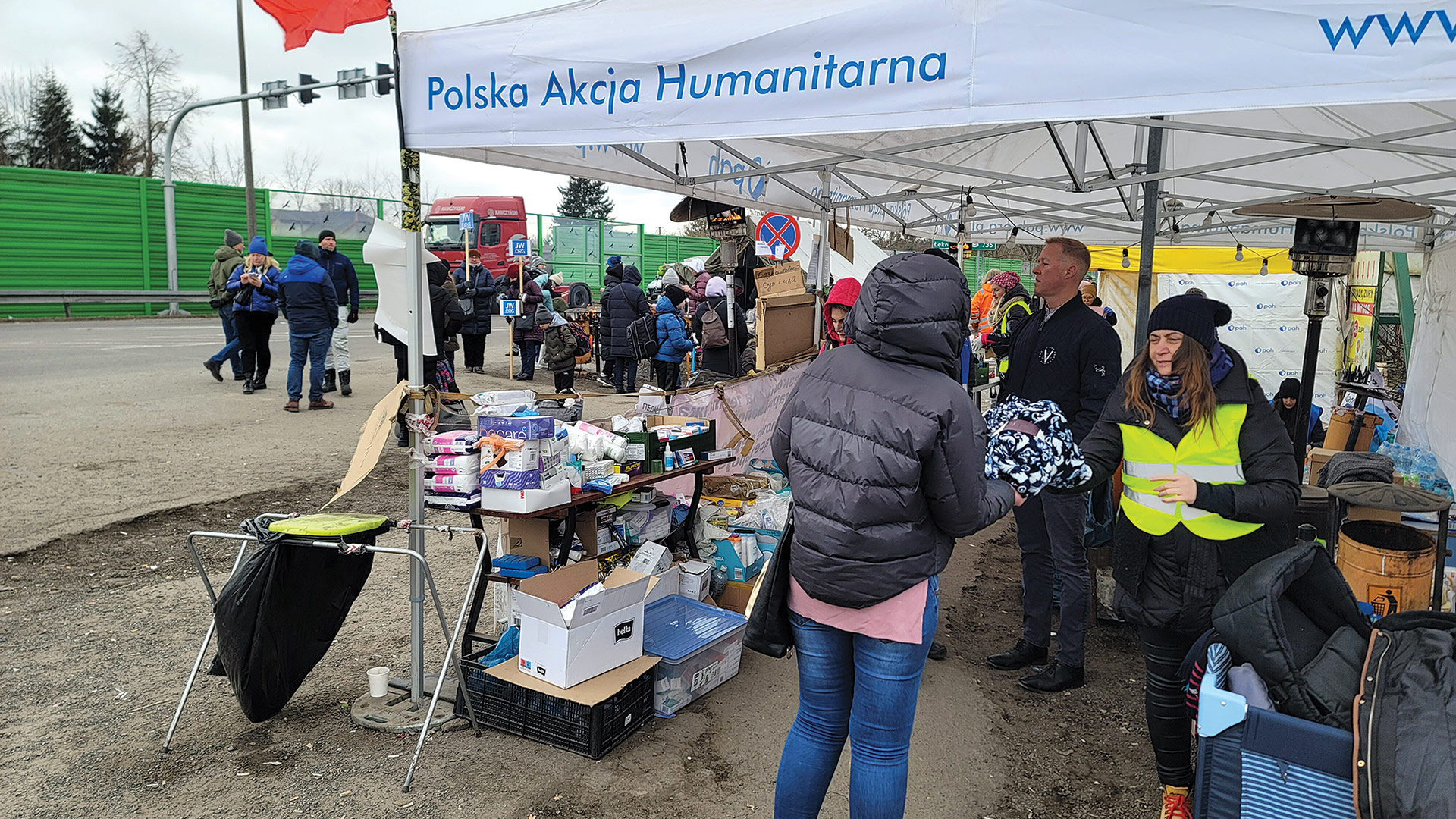
Paul Kozub says his trip to the border in March was surreal in many respects and included work as a “war correspondent.”
As for his planned July trip back to Poland, Kozub said he plans to reconnect with some of the individuals and families he met at the start of this conflict, including a young man who renovated a 20-unit apartment building in Zyrzyn that is now home to 80 women and children.
“We’re continuing to raise money for them, so I’ll bring some money for that charity,” he said, adding that he also plans to visit — and bring some money to — an orphanage located near the distillery, one that he has been supporting for several years now, which is now housing orphans from Ukraine.
To further assist refugees, and, specifically, Ukranian Children Foundation, Kozub has created a special label for his original V-One vodka, a project that was fast-tracked, with the label being finalized in just a few months, rather than the full year that it normally takes.
It was undertaken as Kozub was introducing another new flavor — Double Espresso — to his growing portfolio, one that is ever-changing and expanding to keep pace in the ultra-competitive vodka market.
The March trip to the distillery was undertaken to finalize the recipe for that new flavor, he said, adding that the overall process has been slowed by supply-chain issues and huge increases in shipping costs and other expenses — challenges that are making it much more difficult to do business in this industry.
Despite these challenges, Kozub wanted to introduce his new label, a project that was conceived just before his March visit, with the expectation that there would be long-term needs among the refugees.
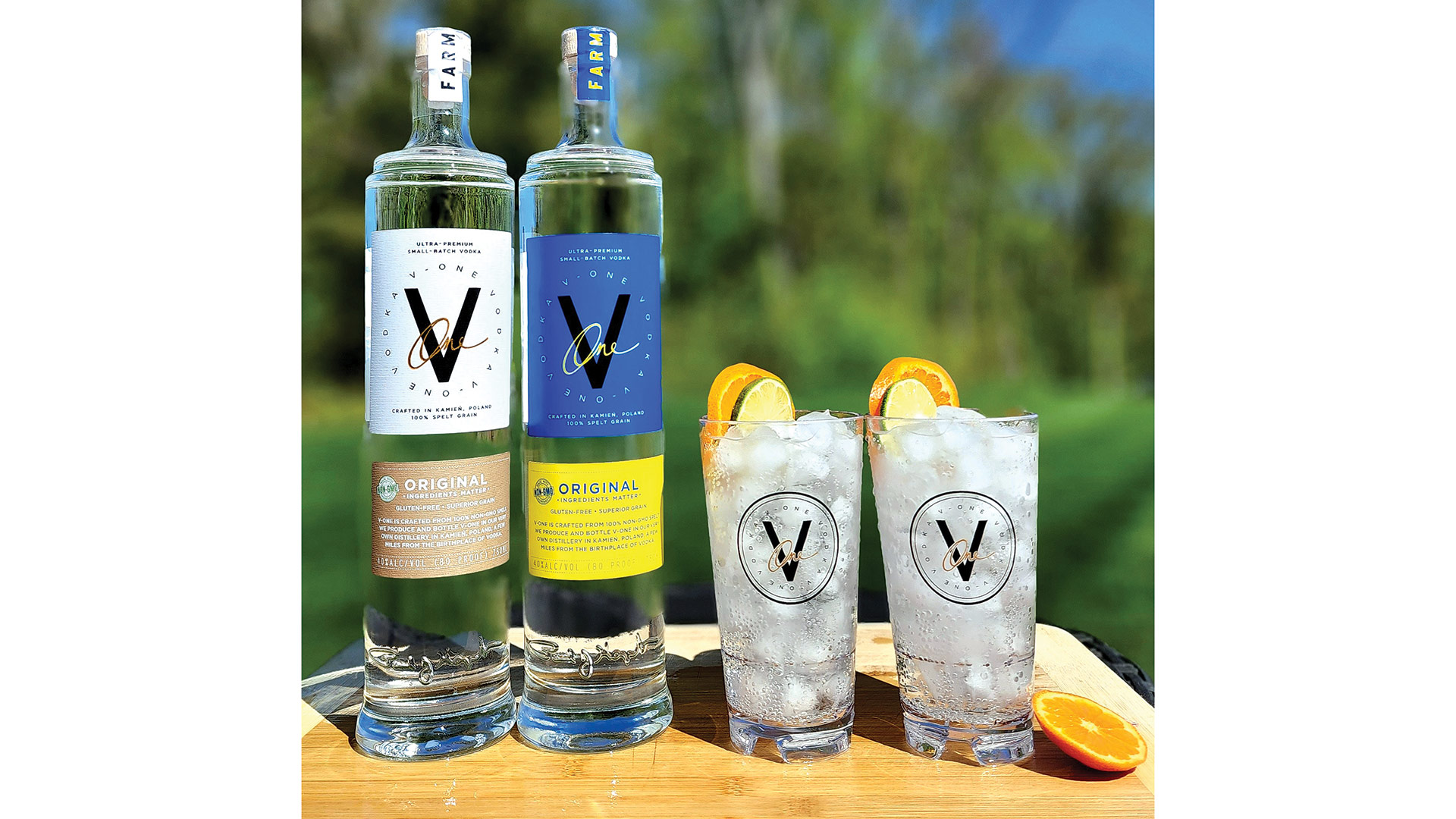
“It takes about a year to get things done, between the approvals and the printing time, and other issues, but we were able to get it done in three weeks,” he said, adding that the son of one of his employees at the distillery drove 10 hours each way to pick up the labels, which were affixed to 3,000 bottles overnight, in time to get on a container ship.
The special edition bottles should arrive by mid-summer, he said, and he expects them to be sold out by August.
His Best Shot
Like most everyone taking in what’s happening in Ukraine — from a few feet from the border or 4,500 miles away — Kozub has no idea when this conflict will end or how it will end.
What he does know is that there are many people still in need. They are an ocean and then a continent away from V-One’s headquarters in Hadley, but only 100 miles or so from where his vodka is made.
Since setting up shop in Poland, he has been active in that ‘community’ and a source of support for orphans and others in need. The landscape there has changed dramatically over the past three months, and Kozub has responded accordingly. As he said, it’s personal for him.
George O’Brien can be reached at [email protected]



